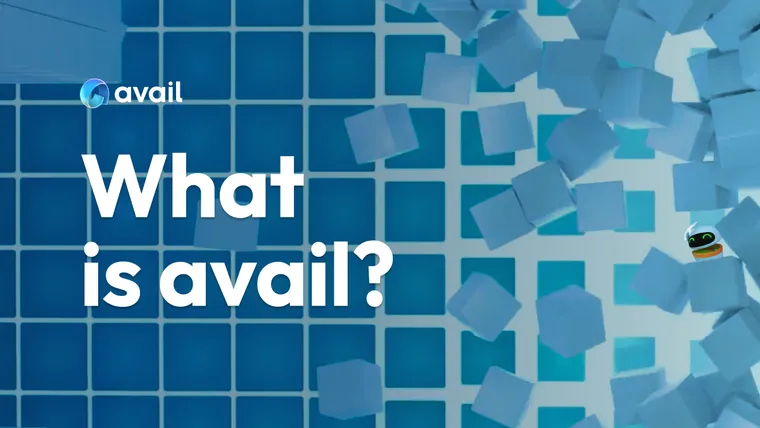Trust is the foundation for a healthy society, and as we have evolved, trusted networks have expanded from small tribes to large institutions. Now blockchains make it possible to expand this circle of trust even further.
However, blockchains have faced significant hurdles in achieving the level of scale and usability that regular users expect. Avail makes it easy for developers to harness the full potential of modular blockchains and is designed to support high volume applications like social media, gaming, DeFi applications and more. It works across any chain, and is strong enough to secure billions of dollars worth of transactions.
Avail is a base layer for secure, scalable and interoperable blockchains. It provides essential functionality for developers to build and deploy custom applications and supports a wide range of implementation options, supporting integrations with the five major rollup stacks (Arbitrum, Optimism, Polygon, Starknet and ZKSync) as well as application ecosystems like Lens Protocol.
Avail started out in Polygon and spun out to form a credibly neutral, independent entity in 2023. The team is led by Polygon’s former co-founder Anurag Arjun and research lead Prabal Banerjee.
Why Avail is Needed
In order for regular people to use blockchains, they need to be affordable and easy to use. For this to happen, core blockchain infrastructure must also be able to meet the demands of mainstream applications. To understand why Avail is needed, let’s start with a little story…
When traditional blockchains built with a monolithic architecture are used by more and more people, they begin hitting scalability limitations. An example of this was experienced when demand spiked and people were paying $50, $100 or even $200 or more for a single transaction on Ethereum. This is obviously untenable and to fix it, the computation to process transactions was moved off Ethereum on to rollups.
This freed up Ethereum as it could now process rollup transactions in bulk from other blockchains like ZKsync and Polygon. Transaction costs on rollups became significantly lower for users too.
Rollups not only require significantly less effort for developers to build and deploy into production, they can rely on the security of the base layer they are built on. In this case, new rollups were able to quickly spin up and inherit the security of Ethereum. This led to the creation of a lot more blockchains on Ethereum… but what’s the catch?
Interoperability within the Ethereum ecosystem got a whole lot harder as the rollups on top don’t interoperate very well. An asset on ZKsync is not easily moved to Polygon and vice versa.
Interoperability wasn’t the only challenge that came with shifting to a rollup-centric roadmap. As more people started using rollups, new scalability constraints began to emerge. Up to 80-90% of the fees paid to Ethereum from rollups was going towards covering the costs of data availability, and they were paying up to $1,800-$1,900 per MB for it. These costs have since been reduced with the introduction of EIP-4844, which made data availability much cheaper on Ethereum, for now.
While we have used Ethereum in this example, scaling any monolithic blockchain will lead to the same outcomes. In order to scale rollups, data availability capacity needs to scale, and current approaches to scaling data availability don’t adequately address interoperability.
Avail has been closely observing the evolution of blockchain scaling. It has taken all the lessons on board and applied the best technology available to build Avail, addressing these challenges from first principles.
Avail DA provides scalable data availability capacity that any rollup can use. Avail Nexus addresses interoperability so that moving assets within (and beyond) Avail’s ecosystem is really easy to do. Fusion security adds crypto-economic security to strengthen the network against attack. All of this leads to a secure, scalable foundation and connected ecosystem which can grow with the demands of the community.
What does Avail offer?
Avail provides a flexible foundation for developers building blockchains and blockchain based applications. It supports various types of blockchain constructs and is very well supported with technical integrations across the ecosystem.
Avail enables blockchain apps to scale and interoperate with ease. The unification layer for web3 sets out Avail’s vision to enable smooth interoperability between all blockchains.
What can you build on Avail?
Avail’s general purpose foundation supports any blockchain use case including app specific chains, DeFi applications and web3 games.
Recognizing the importance of data availability capacity for blockchains, Avail’s founders set out to build the fastest, most secure, decentralized and scalable data availability solution they could.
The result is Avail DA. It protects the integrity of transaction data and makes blockchains fast, affordable and scalable. It provides developers with core blockchain infrastructure they can start using today with the integration only requiring a few lines of code. This way developers can shift their focus towards building apps and acquiring users.
Developers inherit all of Avail’s core features upon integration, including a decentralized validator set, a network of light clients (with data availability sampling), validity proofs and DA verification that can be done from a user’s phone.
Blockchains can also leverage Nexus to access seamless cross-chain capabilities without the costs and difficulties of submitting multiple proofs and coordinating with different networks.
To illustrate how Nexus works, let’s take the following example;
- Chain A is an NFT blockchain
- Chain B is a payments blockchain
With Nexus a user can purchase an NFT on Chain A without needing funds on A. The funds they already have on Chain B allow them to purchase assets on other chains without bridging them. This significantly improves the web3 UX, and builders no longer have to worry about how they will convince users to bridge their assets before using their new service. Learn more about Nexus.
How secure is the Avail blockchain?
Avail utilizes Nominated Proof of Stake (NPoS) which is one of the most decentralized blockchain designs available today. It achieves this by ironing out stake across the validators. This way, a handful of validators can’t easily collude to overpower the network, a credible threat facing Delegated Proof of Stake (DPoS) blockchains. The Avail blockchain will support up to 1,000 active validators on mainnet, and has the ability to increase the validator set over time.
Avail’s blockchain is secured by the AVAIL token and additional crypto-economic security will be contributed via a basket of assets staked on Avail Fusion. Holders of major crypto assets like BTC and ETH can stake their tokens via Avail Fusion to secure the Avail blockchain in return for staking rewards. This creates a secure mesh, made up of multiple tokens that contribute to the underlying security of the Avail blockchain.
If you’ve enjoyed learning about Avail, here’s some more articles you might enjoy:
- Data Availability: What Is It?
- AVAIL: The Token Powering Blockchain Unification
- Avail's Vision: The unification layer for web3.
- A Guide to Selecting the Right Data Availability Layer
- How to build on Avail Today
To keep up to date with Avail, follow us on X, Discord, and Telegram.


